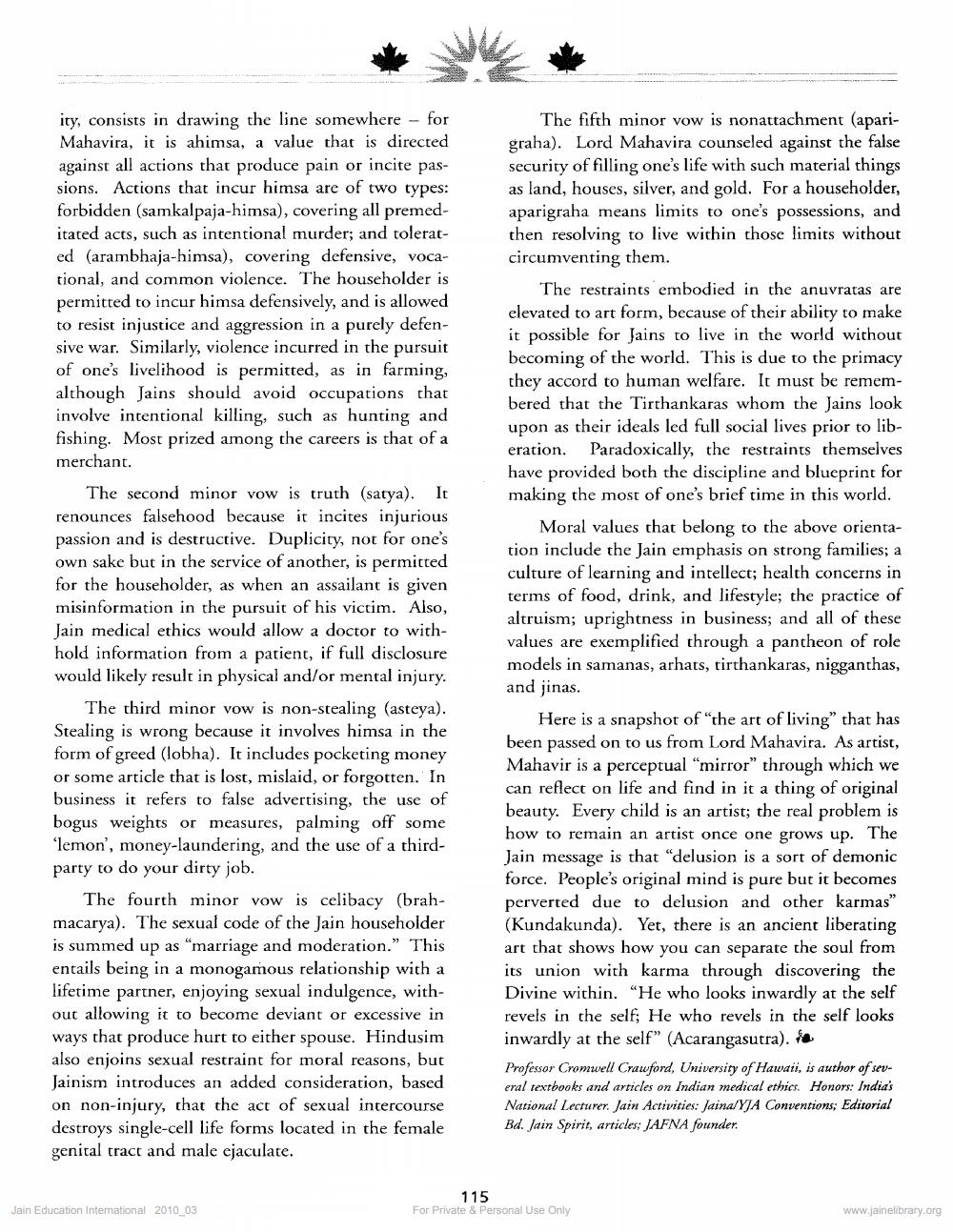________________
ity, consists in drawing the line somewhere for Mahavira, it is ahimsa, a value that is directed against all actions that produce pain or incite passions. Actions that incur himsa are of two types: forbidden (samkalpaja-himsa), covering all premeditated acts, such as intentional murder; and tolerated (arambhaja-himsa), covering defensive, voca tional, and common violence. The householder is permitted to incur himsa defensively, and is allowed to resist injustice and aggression in a purely defensive war. Similarly, violence incurred in the pursuit of one's livelihood is permitted, as in farming. although Jains should avoid occupations that involve intentional killing, such as hunting and fishing. Most prized among the careers is that of a merchant.
The second minor vow is truth (satya). It renounces falsehood because it incites injurious passion and is destructive. Duplicity, not for one's own sake but in the service of another, is permitted for the householder, as when an assailant is given misinformation in the pursuit of his victim. Also, Jain medical ethics would allow a doctor to withhold information from a patient, if full disclosure would likely result in physical and/or mental injury.
The third minor vow is non-stealing (asteya). Stealing is wrong because it involves himsa in the form of greed (lobha). It includes pocketing money or some article that is lost, mislaid, or forgotten. In business it refers to false advertising, the use of bogus weights or measures, palming off some "lemon', money-laundering, and the use of a thirdparty to do your dirty job.
The fourth minor vow is celibacy (brahmacarya). The sexual code of the Jain householder is summed up as "marriage and moderation." This entails being in a monogamous relationship with at lifetime partner, enjoying sexual indulgence, without allowing it to become deviant or excessive in ways that produce hurt to either spouse. Hindusim also enjoins sexual restraint for moral reasons, but Jainism introduces an added consideration, based on non-injury, that the act of sexual intercourse destroys single-cell life forms located in the female genital tract and male ejaculate.
Jain Education International 2010_03
The fifth minor vow is nonattachment (aparigraha). Lord Mahavira counseled against the false security of filling one's life with such material things as land, houses, silver, and gold. For a householder, aparigraha means limits to one's possessions, and then resolving to live within those limits without circumventing them.
The restraints embodied in the anuvratas are elevated to art form, because of their ability to make it possible for Jains to live in the world without becoming of the world. This is due to the primacy. they accord to human welfare. It must be remembered that the Tirthankaras whom the Jains look upon as their ideals led full social lives prior to liberation. Paradoxically, the restraints themselves have provided both the discipline and blueprint for making the most of one's brief time in this world.
Moral values that belong to the above orientation include the Jain emphasis on strong families; a culture of learning and intellect; health concerns in terms of food, drink, and lifestyle; the practice of altruism; uprightness in business; and all of these values are exemplified through a pantheon of role models in samanas, arhats, tirthankaras, nigganthas, and jinas.
Here is a snapshot of "the art of living" that has been passed on to us from Lord Mahavira. As artist, Mahavir is a perceptual "mirror" through which we can reflect on life and find in it a thing of original beauty. Every child is an artist; the real problem is how to remain an artist once one grows up. The Jain message is that "delusion is a sort of demonic force. People's original mind is pure but it becomes perverted due to delusion and other karmas" (Kundakunda). Yet, there is an ancient liberating art that shows how you can separate the soul from its union with karma through discovering the Divine within. "He who looks inwardly at the self revels in the self; He who revels in the self looks inwardly at the self" (Acarangasutra).
Professor Cromwell Crawford, University of Hawaii, is author of several textbooks and articles on Indian medical ethics. Honors: India's National Lecturer. Jain Activities: Jaina/YJA Conventions; Editorial Bd. Jain Spirit, articles; JAFNA founder.
115
For Private & Personal Use Only
www.jainelibrary.org




